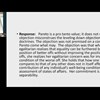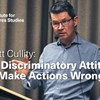morally
How should we make decisions when we’re uncertain about what we ought, morally, to do?
Very often we are uncertain about what we ought, morally,to do. We do not know how to weigh the interests of animals against humans, how strong our duties are to improve the lives of distant strangers

Richard Arneson: Should we reward the deserving? Some puzzles
Do plausible fundamental principles of justice incorporate the idea of rewarding the deserving? Utilitarianism is famously indifferent between a world in which saints fare badly and scoundrels fare we
Do Offenders Deserve Proportionate Punishments?
Criminal Law & Philosophy Abstract The aim of the paper is to investigate how retributivists should respond to the apparent tension between moral desert and proportionality in punishment. I argue th
Richard Arneson: Should we reward the deserving? Some puzzles
Richard Arneson is a political philosopher with a special interest in theories of social justice. AbstractDo plausible fundamental principles of justice incorporate the idea of rewarding the deserving?
Theron Pummer: Future Suffering and the Non-Identity Problem
Venue:Institutet för framtidsstudier, Holländargatan 13, 4th floor, Stockholm, or online. Research seminar with Theron Pummer, Professor of Philosophy at the University of St Andrews. Register hereAbstr

Garrett Cullity: How Discriminatory Attitudes Can Make Actions Wrong
Research seminar with Garrett Cullity, professor of philosophy at the Australian National University, known for his research on moral philosophy. Abstract In general, otherwise permissible actions do

Garrett Cullity: How Discriminatory Attitudes Can Make Actions Wrong
Research seminar with Garrett Cullity, professor of philosophy at the Australian National University, known for his research on moral philosophy. Abstract In general, otherwise permissible actions do
Review of Elizabeth Barnes, The Minority Body: Theory of Disability
Oxford: Oxford University Press, 2016, pp. 224, £25. Ratio. doi:10.1111/rati.12151 What does being disabled mean for the disabled individual’s life? Does being a disabled individual have inherent negatregarding disability.
Climate change, risk and population ethics - Tore Browaldh-föreläsningen 2016
Gustaf Arrhenius will give the Tore Browaldh-lecture this year in Gothenburg. One of the most important insights to emerge over the past hundred years is that the actions of the current generation – th
Åsa Burman and Katharina Berndt Rasmussen: Implicit bias, discrimination, and moral responsibility
Åsa Burman, Director of Studies in practical philosophy at Stockholm University and affilited researcher at the Institute for Futures Studies & Katharina Berndt Rasmussen, Researcher at the Institu








